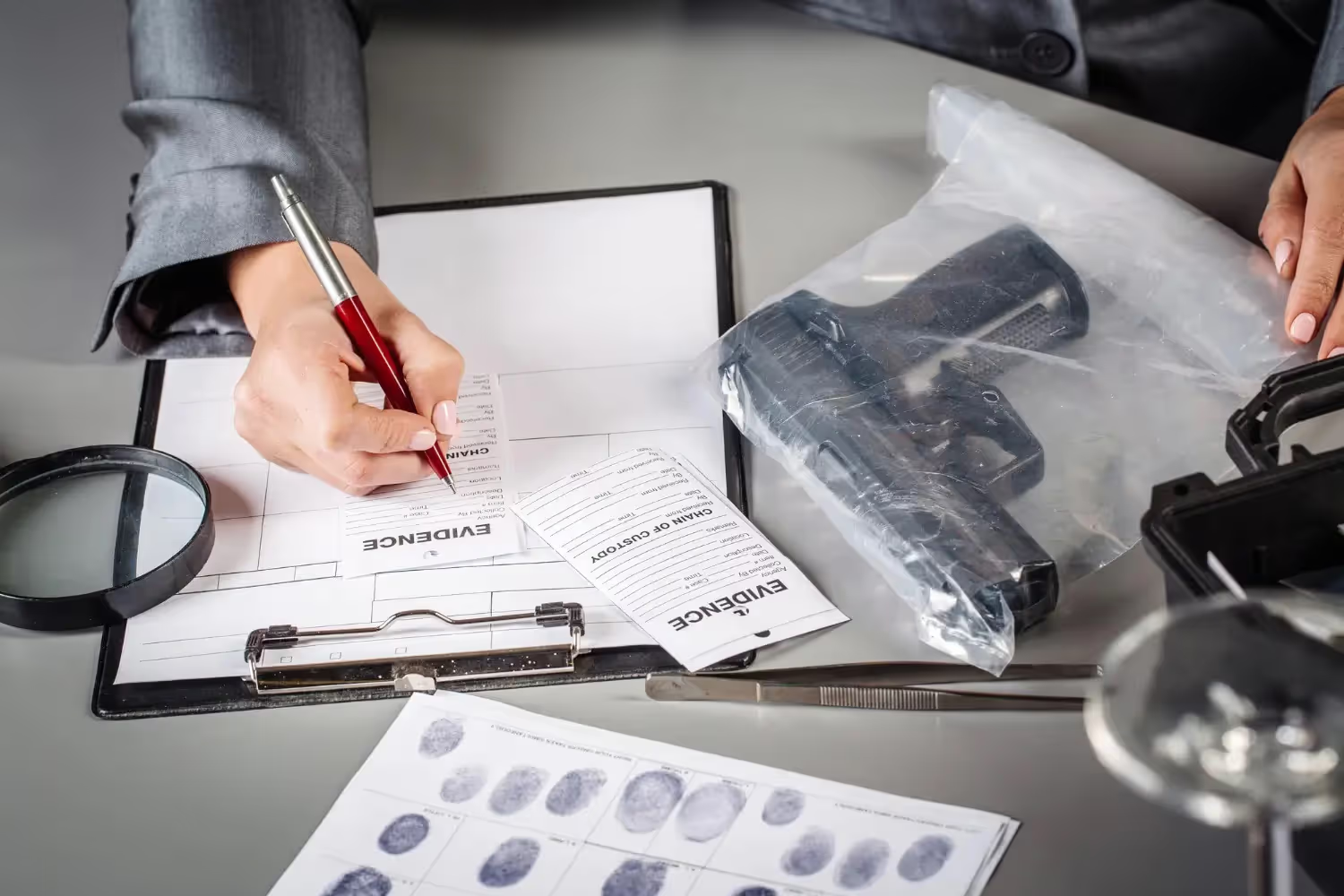Pre-Charge Evidence


When a person faces police investigation, few moments carry more weight than the period before formal charges come down. This is where cases are built or dismantled, and pre-charge evidence is often the key reason why.
Why Pre-Charge Evidence Matters
People often panic when suspected of a criminal offence. Most also assume they cannot take action until the Crown Prosecution Service (CPS) issues charges. This is not only a misconception, but one with potentially disastrous consequences.
The truth is that how pre-charge evidence is managed in the early stages of an investigation often determines whether a case ever makes it to court. Poor handling can lead to wrongful accusations while a more proactive legal strategy can prevent prosecution entirely.
At Holborn Adams, we understand that the pre-charge phase is not just another procedural step. This is where the right legal advice can help clients take on the criminal justice system. We have won numerous pre-charge cases on behalf of our clients.
In this article, we will discuss why evidence matters to your rights, reputation, and future.

Understanding What Counts as Pre-Charge Evidence
So, what is pre-charge evidence? In simple terms, it refers to any information collected by investigators prior to the CPS making a charging decision. This can include a wide range of material, including:
- Witness statements
- CCTV footage
- Forensic test results
- Interviews under caution
- Social media posts, online messages
- Mobile data
- Financial or medical records
- Emails, cloud storage
Under the Attorney General’s Guidelines on Disclosure (2020), investigators must handle this material fairly and proportionately. They must record and retain evidence that supports the prosecution’s case as well as material that could assist the defence.
This does not always happen in practice.
We call information that might cast doubt on the allegations “exculpatory evidence.” In some instances, the defence must actively identify this evidence, or else crown prosecutors will overlook or minimise it.
This is why having an experienced solicitor at the pre-charge stage is so valuable. A strong defence team will not just wait for the CPS to act. Instead, they scrutinise the evidence, request missing material, and ensure that they bring all relevant facts to light.
Gathering and Managing Pre-Charge Evidence
Pre-charge evidence collection usually begins immediately after a complaint or arrest occurs. At first, police may seize digital devices, collect forensic samples, or take witness statements.
Once gathered, investigators will review this material and then submit it to the CPS for assessment. This process can take weeks or even months, leaving the suspect in a prolonged state of uncertainty.
Again, the law requires investigators to collect and preserve evidence objectively. However, in some instances, human bias can creep in. Investigators often focus on evidence that supports a charge. They may ignore evidence that could clear the suspect. This phenomenon, often referred to as “evidential tunnel vision,” can lead to serious miscarriages of justice.
By adding clarity, suggesting alternative lines of enquiry, and monitoring evidence handling, your defence team can prevent the formation of a one-sided narrative. This proactive oversight helps ensure that the CPS considers all material, favourable or otherwise.
Why Early Access to Pre-Charge evidence Matters
Timing is everything in criminal defence. The earlier a solicitor accesses pre-charge evidence, the more influence they have over how the case develops.
Early review enables the defence to spot contradictions, identify procedural breaches, and highlight missing or overlooked information. For example, a witness statement may contradict earlier accounts, CCTV footage might undermine the alleged timeline, and a digital record could provide an alibi.
With this information, legal teams can create focused written statements for the CPS. They will explain why there is not sufficient evidence to meet the charging threshold. These proactive submissions often lead to “no further action” decisions very early on.
However, once the CPS decides to prosecute, it becomes far harder to challenge the accepted evidential narrative.
Common Challenges and Misconceptions About Pre-Charge Evidence
One of the biggest misconceptions about pre-charge evidence is that suspects have no right to see or influence it before being charged. While full disclosure is not available until later in the process, pre-charge representation protocols allow solicitors to negotiate access to specific materials.
Another challenge lies in the realities of modern policing. Backlogs in forensic analysis, the sheer volume of digital data, and stretched police resources mean investigations can drag on for months or even years. This leaves individuals in the dark about their position.
Proactive legal intervention helps to keep investigations moving. Solicitors can push for updates, challenge unnecessary delays, and maintain communication with investigators to ensure clients have vital information.
Finally, some people worry that providing defence evidence too early “gives away their case.” However, the opposite is usually true. By presenting credible material that undermines the prosecution’s theories, you may prevent the case from ever reaching court.
The Connection Between Pre-Charge Evidence and CPS Charging Decisions
The CPS decides whether to bring charges based on what’s known as the Full Code Test, which has two parts:
- The Evidential Stage – Is there enough reliable evidence to provide a realistic prospect of conviction?
- The Public Interest Stage – Is it in the public interest to prosecute?
Pre-charge evidence directly shapes the first part of this test. If the evidence is weak, inconsistent, or easily undermined by new information, the CPS is unlikely to proceed. However, these decisions often hinge on how effectively the defence presents its findings and communicates with the CPS.
At Holborn Adams, we prioritise direct contact with prosecutors. Our submissions are not emotional appeals but clear, evidence-based arguments that question whether the evidential threshold has truly been met.
This approach has led to countless early dismissals, saving clients from months or years of unnecessary proceedings.
The Risks of Failing to Act During the Pre-Charge Evidence Stage
Waiting passively for the CPS to make a decision can be one of the most costly mistakes a suspect makes.
When the defence fails to act, investigators may interpret evidence without proper context. If the CPS ignores or overlooks exculpatory material, it may make decisions based solely on the police narrative.
Again, after the CPS issues formal charges, the options for resolution narrow sharply. Many dismissible cases instead proceed to court, bringing public exposure, financial strain, and emotional distress.
Beyond the legal risks, there’s also the personal impact. Individuals under investigation often face anxiety, reputational damage, and strains on their personal and professional lives.
How Holborn Adams Handles Pre-Charge Evidence
At Holborn Adams, we see managing pre-charge evidence as both a science and an art. Each case starts with a careful review of the material. This is done by a team of experienced legal strategists, digital forensic experts, and private investigators. It ensures that no piece of evidence is accepted at face value and that any discrepancies are identified immediately.
Next, our solicitors communicate directly with investigators and the CPS to present defence material before they make a charge. Where appropriate, we highlight procedural or disclosure errors. This helps ensure that only fair and reliable evidence is considered.
In complex or high-profile cases, our team can also help manage media and reputational risks. This helps keep matters as discreet as possible. We understand that in today’s world, public perception can be as damaging as the legal process itself. That is why we work to control the narrative before it reaches the press or the courtroom.
Our goal is to prevent charges where possible. If we cannot accomplish that, we work to ensure that proceedings are based on a complete and accurate evidential foundation.
Conclusion
Whether a suspect faces trial or walks free can depend entirely on how pre-charge evidence is identified, reviewed, and challenged.
Proper handling of this material can expose weaknesses in the prosecution’s case, reveal critical new facts, and lead to “no further action” outcomes that preserve both freedom and reputation.
The earlier you contact a solicitor, the greater the opportunity to influence that outcome. If you or someone you know is under investigation, don’t wait. Pre-charge engagement starts long before you are charged with an offence.
Contact Holborn Adams immediately to ensure every piece of evidence is reviewed, every opportunity explored, and every right protected, before it’s too late.




